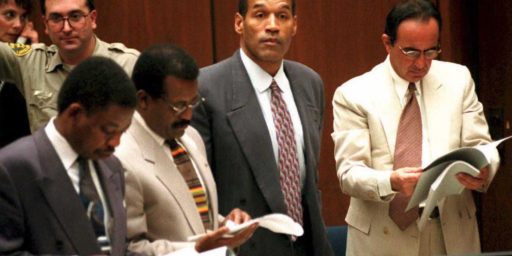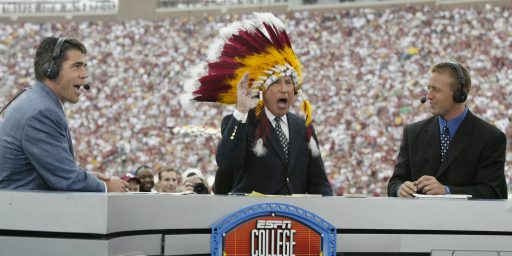Ralph Wiley, R.I.P.
I just heard on PTI that sports columnist Ralph Wiley died from a heart attack last night while watching the NBA Finals. While I thought Wiley was a bit too obsessed with race issues, I always found him to be a thoughtful commentator, both in his columns and occasional appearances on ESPN television. He was only 52.
His column archives are at ESPN.
ESPN.com – Wiley, 52, was provocative, respected writer
Ralph Wiley, one of the original Page 2 columnists and former senior writer for Sports Illustrated, died Sunday night at his home in Orlando of heart failure. He was 52 years old.
Wiley joined Page 2 at its inception in November 2000 and had written more than 240 columns for ESPN.com.
“For the past three and a half years, Ralph has produced a body of work that was both exceptional and insightful and arguably the best sports commentary on the web,” said John Walsh, executive vice president and executive editor, ESPN.
Wiley also had appeared on ESPN’s “Sports Reporters” since 1990. He provided regular commentary for ESPN’s SportsCenter and formerly worked as an NFL analyst for NBC.
“Through his perspective and experience, Ralph developed one of the most creative lead voices in the American sports chorus,” added ESPN.com vice president and executive editor Neal Scarbrough. “We were lucky to have him as a big part of ESPN.com.”
***
Sports Illustrated hired Wiley in 1982, and he remained there for nine years, writing 28 cover stories, many about boxing (most notably, the Mike Tyson trial), baseball and football.
“He clearly brought a unique perspective,” said Roy Johnson, assistant managing editor for Sports Illustrated. “He was never afraid of bringing a consciousness that was often overlooked in the sports world. It was one that valued the athlete and went the extra mile to discover the essense of either their greatness or tragedy.
“At a time when people look at the surface or look at stats, Ralph kind of threw them in the trash, and tried to get to the essense of the athlete.”
***
His second book, a collection of essays entitled “Why Black People Tend to Shout” was rejected, Wiley estimated, “25 or 30 times” by publishers. The book sold well and also got good reviews. “It is not easy to express how it feels to be a black man in the 1990s,” wrote Alex Raksin in the Atlanta Journal-Constitution. “Ralph Wiley is one of the few who have been able to find just the right tone.”
Wiley’s writing was intentionally provocative. “As an essayist I don’t believe in the fiction of an anonymous observer. Rather than the sham of objectivity, I think you should put your perspective up front. That’s only fair to the reader,” he told Essence in 1993, shortly after the publication of his second book of essays, “What Black People Should Do Now: Dispatches from Near the Vanguard”, was published in 1993.
Wiley’s third book of essays, “Dark Witness: When Black People Should Be Sacrificed (Again)”, was published in 1996. One of the more memorable segments of that book was “Trial of the Century.” Wiley wrote of the O.J. Simpson trial from the perspective of having worked with Simpson on TV just a few years earlier. Wiley’s portrait of the Simpson he knew was less than flattering.





Ralph Wiley will be sorely missed. His insight in the world of sports journalism and social commentary is unmatched. His work will live on forever and his named should be mentioned with the alltime greats in sports journalism, journalism period.
Ralph may your soul rest in peace. Your life will not be mourned but celebrated. You are one of the true heros
I only came to know the Wiley voice recently. As a white guy growing up on the playgrounds in Philly I knew what it was to be racist. It was a lesson I learned as a boy and took a long time to get over.
Now that I see the world without tinted glasses I celebrate the moments when I come across like-minded people. Ralph’s voice sang strong and clear, just too briefly for me. It is a song we can all sing and Ralph’s words can be the lyric.
His legacy to me is to speak the truth as you feel it and let the cards fall where they may when it comes to how others react.
It’s the truth, brother. No need to be pissed about it.
I loved the man’s vision and voice.
Ralph was a strong voice who represented everything positive about being a black man in America: Educated, articulate, successful, insightful, but never too prideful.
Ralph’s voice shouted from the “Vanguard” – Wake Up Black People!!! – You were called to be more than what the dreadful statistics would suggest.
His voice, though now silent, will forever echo to those who choose to be enlightened.
~ Fitzgerald
My condolences go out to the Wiley family. This young man, the same age as I, an Afro-American also, is one of the few contemporaries of mine that garnered such respect from me, especially in his chosen professional endeavor. He is already missed. Only the good die young!! God bless andfkeep him, now and forever. In a way he is very fortunate. He is free of the devastation BUSH-league has heaped on this country and the world!!!
When I heard that Ralph Wiley had died of a an apparent heart attack, I could hardly believe what I was hearing. Ralph was a one of a kind sports journalist. Never shy about voicing his insightful opinions, he shot straight from the hip with everyone. His style was edgy but welcome at a time when it was even more difficult to discuss race & sport. He will be sorely missed.
Ralph Wiley’s comments on America’s prejudging of Barry Bonds was legendary and true to form. Clearly not a bandwagon journalist, he was always willing to bring perspective to a conversation. I enjoyed the times I saw him on ESPN or read something he wrote because I knew it would be thought provoking. Clearly he knew his calling and embraced it with enthusiasm. Ralph Wiley reminds me to go beyond the surface in the work I do and as a result, raise the standard.
May he rest in peace and God’s blessings to his family, friends and colleagues.
I recently had the pleasure of meeting Ralph Wiley when he came to my city to speak, and then to my campus to engage us in his usual thoughtfuly provocative conversation about the realities of race and sport in America, especially on college campuses.
Of course, I could have no way of knowing then how fortunate that brief but engaging time was with one of the truly gifted writers and tellers of tales we’ve produced as a nation. I read the comment on the headline of this site that the author thought Ralph to be a thoughtful commentator, but “a bit too obsessed with race issues…”, and I smiled.
In my conversation with Ralph at breakfast that morning, we talked about that topic. We, a black woman and a black man, lamenting that oft repeated observation that is no doubt frequently borne of sincerity…of privilege. The privilege of either having no clue about the everpresent specter of race in America, or the privilege of ignorance/denial of living it.
Ralph was who he was because he was young, gifted and black. His perspective and his sense of self came from being a bright mind and compelling voice, on paper and in sound in a black male body in this country. He brought his head and his heart to his work and to his commitment to speaking truth to power; the power of race to marginalize, revere, define, disdain, embrace and color our capacity to see race when it suits us and to deny it when it doesn’t.
Ralph was profound in his ability to cut through veil of convenience and tell it like it is for many people every day of their lives, even when it seemed obsessive to others. Rest in Peace, my brother and know that the truth is the light and it shines even on the cloudiest and most inconvenient of days.
—